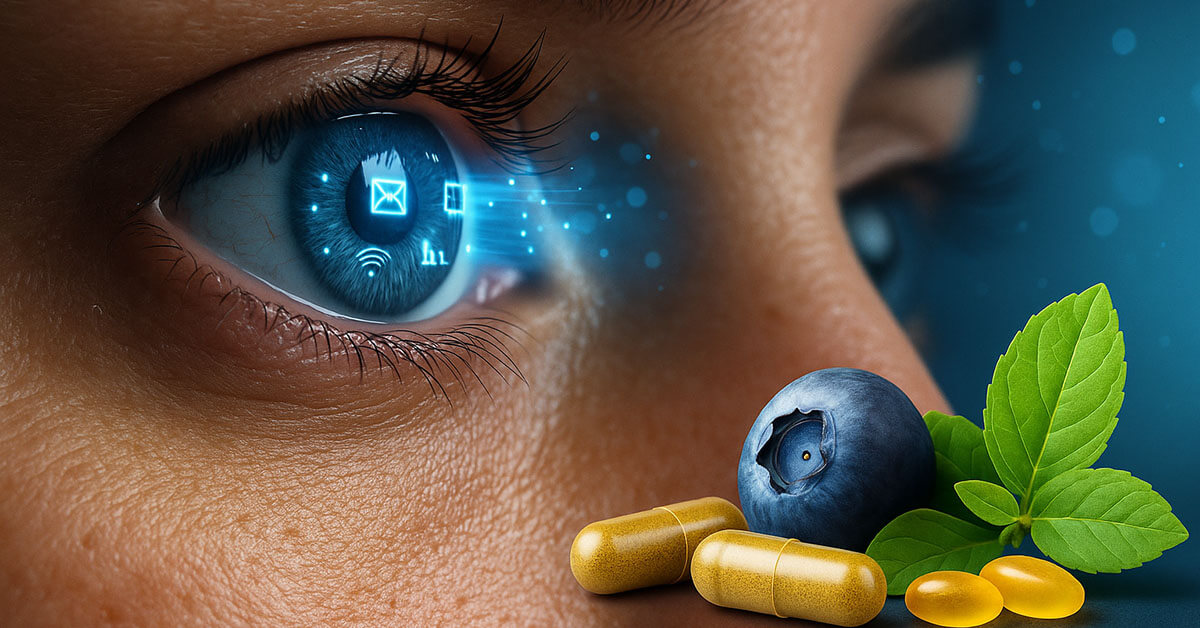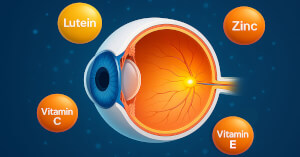
Digital Eye Strain Is Real: Here’s How to Protect Your Vision Naturally

If your eyes feel tired, dry, or blurry after staring at screens all day, you're not imagining things: digital eye strain is a real problem. Whether you work at a computer, scroll endlessly on your phone, or binge Netflix at night, your eyes are working overtime. And they’re not happy about it.
The good news? You don’t have to suffer through it. With a few smart habits and the right supplements, you can protect your vision, reduce fatigue, and feel sharper, all without quitting screen life. Let’s break it down.
Why Your Eyes Are Tired All the Time
Ever heard of Computer Vision Syndrome (CVS)? It's the fancy name for what happens when you spend hours a day on screens. Your eyes weren’t built for this kind of constant near-focus. Over time, that leads to:
- Dry, irritated eyes
- Blurred or double vision
- Headaches and neck strain
- Sensitivity to light
- Trouble focusing, even off-screen
If you’re nodding along, keep reading, this is for you.
How Screen Time Affects Your Eyes
Every screen, whether phone, laptop, or tablet, emits blue light. This short-wave light penetrates deep into the eye and may contribute to retinal stress over time. Combine that with poor posture, artificial lighting, and reduced blinking (yes, we blink *less* when we focus), and you’ve got the perfect storm for digital eye strain.
Your tear film dries out. Your eye muscles stay constantly flexed. Your retina takes a hit. No wonder your eyes feel like sandpaper by 6 p.m.
Simple Daily Habits to Reduce Eye Strain
You don’t need a complete lifestyle overhaul, just a few consistent tweaks:
The 20-20-20 Rule
Every 20 minutes, look at something 20 feet away for 20 seconds. Set a reminder, your eyes will thank you.
Adjust Your Screen Settings
Reduce brightness, boost contrast, and match screen tone to your environment. Also: turn on dark mode when possible.
Use Artificial Tears or a Humidifier
Combat dry indoor air and help restore natural moisture to your eyes. Blink more consciously, especially during deep focus.
Block Blue Light at Night
Enable “Night Shift” or use blue-light blocking glasses after sunset. Better sleep = better eye recovery.
Top Supplements That Support Eye Health for Screen Users
If your eyes are taking a daily beating from screens, it might be time to give them internal support. These science-backed supplements can help reduce fatigue, filter blue light, and nourish your visual system from within.
Astaxanthin
A powerful antioxidant from microalgae, astaxanthin helps reduce eye fatigue, especially from screen overuse. It protects against oxidative stress in the retina and improves visual sharpness.
When to take it: Morning, with a fat-containing meal.
Dosage: 4–12 mg daily
Lutein
Lutein is a carotenoid that naturally accumulates in the retina and acts like internal sunglasses. It filters blue light and helps reduce glare sensitivity, ideal for screen workers.
When to take it: Anytime with food (especially fats).
Dosage: 10–20 mg daily
Zeaxanthin
Often paired with lutein, zeaxanthin supports the macula, the part of the eye responsible for central vision. It enhances visual clarity and defends against blue light and oxidation.
When to take it: With lutein, during a meal.
Dosage: 2–5 mg daily
Bilberry
Used for centuries to support night vision, bilberry improves microcirculation in the eyes and may reduce inflammation and oxidative stress from screen use.
When to take it: Morning or early afternoon.
Dosage: 80–160 mg standardized extract daily
Omega-3 (EPA/DHA)
Omega-3 fatty acids help prevent dry eye syndrome by supporting tear film production and reducing inflammation. A must-have for anyone with itchy or tired eyes.
When to take it: With meals (split dose AM/PM if high dose).
Dosage: 500–1,000 mg DHA + EPA daily
Vitamin A
Vitamin A is crucial for the health of the cornea and retina. A deficiency can cause night blindness and dry eyes, especially in screen-heavy lifestyles with poor diets.
When to take it: With food (especially fats).
Dosage: 900 mcg/day (men), 700 mcg/day (women)
When to Consider Eye Supplements
If you experience any of the following, you might benefit from vision support supplements:
- You spend 5+ hours/day on screens
- Your eyes feel dry, itchy, or strained by evening
- You notice blurred vision, glare sensitivity, or headaches
- Your diet lacks colorful vegetables or omega-3s
- You want to prevent long-term issues like macular degeneration
Supplements work best when used consistently, over time, think of them as daily eye insurance.
Final Thoughts: Take Care of Your Eyes Now Before It’s Too Late
Your eyes are doing a full-time job. And with screens everywhere, they rarely get a break. But you don’t have to live with strain, fatigue, or blurry vision.
With a few daily tweaks, like taking eye-friendly supplements, practicing screen hygiene, and remembering to blink, you can protect your sight and feel better day to day.
Digital eye strain is real, but it doesn’t have to be your new normal. Treat your eyes well now, and they’ll serve you clearly for years to come.
This article was originally published on Stackbb, your trusted source for science-based supplement guides.





